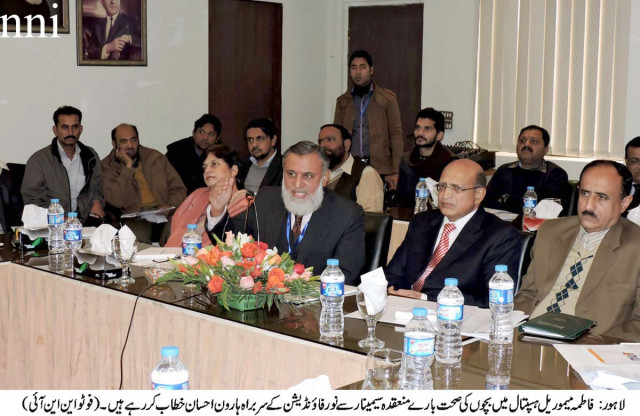School Health Programme: ‘Health, Education Depts should own new initiative’
Consultative meeting held on institutionalising School Health Programme.

Nur Foundation CEO Dr Haroon Ihsan said that people at the grassroots level must be included in community interventions. He expressed the hope that the recommendations suggested at the discussion would manifest in practical form. PHOTO: NNI
The School Health Programme (SHP) aims to reach out to children and their families and should be owned by the Health and Education Departments.
These recommendations were put forth by participants during a consultative meeting on institutionalising the SHP in the Punjab. The event was organised by the Nur Centre for Research and Policy (NCRP), a policy think-tank and technical arm of the Fatima Memorial Hospital in Lahore.

The meeting aimed at forming an alliance for advocating the SHP’s institutionalisation. It also focused on the drawbacks and weak areas of the programmes. Dr Mubina Agboatwalla, the HOPE Foundation chairperson, said intervention through hygiene and health-related programmes in schools helped increase the level of understanding in children and their families as well as the community. “This has helped raise awareness at a large scale, making health and hygiene a priority among masses,” she said.
According to an ongoing research study, funded by Ilm Ideas and conducted by the NCRP in Lahore, 90 per cent of students cited the school and teachers as a source of health and nutrition information. The data from October 2014, when 255 students were surveyed in Lahore over 14 days, indicates that 18 per cent students were absent due to falling ill. “Worms in stomach” was reported to be the highest cause of illness among students.
Punjab Elementary Education DPI Malik Riaz said it was unfair to burden teachers with tasks other than teaching in classrooms. “Teachers are engaged in all sorts of campaigns, including census-taking, polio vaccination and elections. Asking them to contribute to more campaigns will be too much,” he said.
“They should not be expected to ignore their classrooms. Why are people not hired for the Health Department for health-related programmes instead of assigning duties to teachers?” he asked.
He pointed towards the failure of the Tawana Programme – a school nutrition package for rural girls across 29 districts that ran from 2002 to 2005.
Dr Nisar Cheema, the former health services director general, said that such programmes were initiatives of the Health Department. However, he said other departments should also take their ownership.
“Their grievances too should be understood. We also have to address issues pertaining to the education system while expecting them to participate and take ownership of the programme,” he said.

He said that advisers and supervisors under any such programme only visited government schools. “Their reach should be expanded to include all schools in their areas. Their recommendations should be taken seriously. They should also be used to disseminate information to a larger number of people,” he said.
Tahir Manzoor, a health expert at the UNICEF, stressed the need for a multi-sector approach in order to produce a comprehensive strategy. “Collaboration amongst departments is necessary to ensure that the programme is sustainable in the long run,” he said.
Dr Hassan Raza, a health adviser at the USAID, expressed similar views. “Once anyone enters a school, there can be no success unless there is support and collaboration from the teachers and head teachers,” he said. Dr Raza added that gaps must be identified in terms of making the programme self-sufficient and sustainable.
Nur Foundation CEO Dr Haroon Ihsan said that people at the grassroots level must be included in community interventions. He expressed the hope that the recommendations suggested at the discussion would manifest in practical form.
The participants agreed to form a consultative group to work on several key points including, promotion of health, coordination between Education and Health Departments and anchoring of the SHP in the education policy. The group decided to hold another meeting in January.
Published in The Express Tribune, January 14th, 2015.



















COMMENTS
Comments are moderated and generally will be posted if they are on-topic and not abusive.
For more information, please see our Comments FAQ